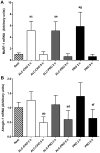Alcohol ingestion impairs maximal post-exercise rates of myofibrillar protein synthesis following a single bout of concurrent training
- PMID: 24533082
- PMCID: PMC3922864
- DOI: 10.1371/journal.pone.0088384
Alcohol ingestion impairs maximal post-exercise rates of myofibrillar protein synthesis following a single bout of concurrent training
Abstract
Introduction: The culture in many team sports involves consumption of large amounts of alcohol after training/competition. The effect of such a practice on recovery processes underlying protein turnover in human skeletal muscle are unknown. We determined the effect of alcohol intake on rates of myofibrillar protein synthesis (MPS) following strenuous exercise with carbohydrate (CHO) or protein ingestion.
Methods: In a randomized cross-over design, 8 physically active males completed three experimental trials comprising resistance exercise (8×5 reps leg extension, 80% 1 repetition maximum) followed by continuous (30 min, 63% peak power output (PPO)) and high intensity interval (10×30 s, 110% PPO) cycling. Immediately, and 4 h post-exercise, subjects consumed either 500 mL of whey protein (25 g; PRO), alcohol (1.5 g·kg body mass⁻¹), 12±2 standard drinks) co-ingested with protein (ALC-PRO), or an energy-matched quantity of carbohydrate also with alcohol (25 g maltodextrin; ALC-CHO). Subjects also consumed a CHO meal (1.5 g CHO·kg body mass⁻¹) 2 h post-exercise. Muscle biopsies were taken at rest, 2 and 8 h post-exercise.
Results: Blood alcohol concentration was elevated above baseline with ALC-CHO and ALC-PRO throughout recovery (P<0.05). Phosphorylation of mTOR(Ser2448) 2 h after exercise was higher with PRO compared to ALC-PRO and ALC-CHO (P<0.05), while p70S6K phosphorylation was higher 2 h post-exercise with ALC-PRO and PRO compared to ALC-CHO (P<0.05). Rates of MPS increased above rest for all conditions (∼29-109%, P<0.05). However, compared to PRO, there was a hierarchical reduction in MPS with ALC-PRO (24%, P<0.05) and with ALC-CHO (37%, P<0.05).
Conclusion: We provide novel data demonstrating that alcohol consumption reduces rates of MPS following a bout of concurrent exercise, even when co-ingested with protein. We conclude that alcohol ingestion suppresses the anabolic response in skeletal muscle and may therefore impair recovery and adaptation to training and/or subsequent performance.
Conflict of interest statement
Figures







References
-
- Hawley JA, Burke LM, Phillips SM, Spriet LL (2011) Nutritional modulation of training-induced skeletal muscle adaptations. J Appl Physiol 110: 834–845. - PubMed
-
- Phillips SM (2006) Dietary protein for athletes: from requirements to metabolic advantage. Appl Physiol Nutr Metab 31: 647–654. - PubMed
-
- Stellingwerff T, Maughan RJ, Burke LM (2011) Nutrition for power sports: middle-distance running, track cycling, rowing, canoeing/kayaking, and swimming. J Sports Sci 29: S79–S89. - PubMed
-
- Coffey VG, Jemiolo B, Edge J, Garnham AP, Trappe SW, et al. (2009) Effect of consecutive repeated sprint and resistance exercise bouts on acute adaptive responses in human skeletal muscle. Am J Physiol Regul Integr Comp Physiol 297: R1441–1451. - PubMed
-
- Coffey VG, Moore DR, Burd NA, Rerecich T, Stellingwerff T, et al. (2011) Nutrient provision increases signalling and protein synthesis in human skeletal muscle after repeated sprints. Eur J Appl Physiol 111: 1473–1483. - PubMed
Publication types
MeSH terms
Substances
LinkOut - more resources
Full Text Sources
Other Literature Sources
Medical
Miscellaneous

